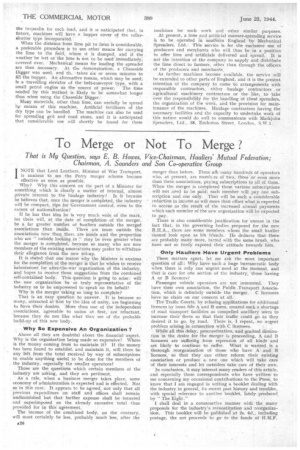To Merge or Not To Merge ?
Page 28

If you've noticed an error in this article please click here to report it so we can fix it.
That is My Question, says E. B. Howes, Vice-Chairman, Hauliers' Mutual Federation; Chairman, A. Saunders and Son Co-operative Group NOTE that Lord Leathers, Minister of War Transport, 1 is anxious to . see the Perry merger scheme become effective as soon as possible.
Why? Why this concern on the part of a Minister for something which is clearly a matter of internal, almost private interest to the haulage industry? Is it because he believes that, once the merger is coMpleted, the industry will be compact, ripe for Government control, even to the extent of nationalization?
H he has that idea he is very much wide of the mark, for there will, at the date of completion of the merger, be a far greater number of hauliers . outside the merged associations than inside. There are more outside the associations now than therc are inside and the proportion who are " outside looking in 'e may be even greater when the merger is completed, because so many who are now members of the existing associations may prefer to withdraw their allegiance from the new set-up.
It is stated that one reason why the Minister is anxious for the completion of the merger is that he wishes to receive 'submissions for after-the-war organization of the industry, and hopes to receive those suggestions from the combined self-contained body.' This question is going to arise: will the new organization be so truly representative of the industry as to be empowered to speak on its behalf?
Why in the merger taking so long to complete?
That is an easy question to answer. It is because so many, attracted at first by the idea of unity, are beginning to have their doubts. More than one of the independent ,association, agreeable to union at first, are reluctant, because they do not like what they see of the probable build-up of this new body.
Why So Expensive An Organization ?
Above all they are doubtful about the financial aspect. Why is the organization being made so expensive? Where is the money coming from to maintain it? If the money has been found to establish and maintain it, will there be any• left from the total received by way of subscriptions to enable anything useful to be done for the members of • the industry, especially the smaller operators? Those are the questions which certain members of the industry are asking, and they are pertinent.
• As a rule, when a business merger takes place, some economy of administration is expected and is effected. Not so in this case. It appears to be agreed, not only that all previous expenditure on staff and offices shall remain undiminished. but that further expense shall be incurred and superimposed on the already excessive total thus provided for in this agreement.
The income of the combined body, on the contrary, will most certainly he less, probably much less, after the merger than before. There al'e many hundreds of operators who, at present, are memle:rs of two, three or even • more than three associations, paying subscriptions to all of them. When the merger is completed these various subscriptions will not need to be paid; each member will pay one subscription and one only. That will be such a considerable reduction in income as will more than offset what is expected to accrue as the result of the increased annual payments which 'eachmember of the new organization will be expected to pay.
There is also considerable justification for unease in the fact that, in the governing bodies proposed for the new R.H.A., there are some members whom the small haulier cannot look upon as his friends. He deduces that there are probably many more, tarred with the same brush, who have not so freely exposed their attitude towards him, Only Hauliers Have Urgent Problems
These matters apart, let me ask the most important question of all : Why have such a huge bureaucratic body when there is only one urgent need at the Moment, and that is care for one section of the industry, those having A or B licences?
Passenger vehicle operg tors are not interested. They have their own association, the Public. Transport Associa tion, which is definitely outside the merger. C licensees have no claim on our concern at all.
The Traffic Courts, by refusing applibations for additional licences by bona fide A and B users, created such a shortage of road transport facilities as compelled ancillary users to increase their fleets so that their traffic could go as they desired it to go, by road. There is, I repeat, no urgent problem arising in connection with C licensees.
While all this delay, procrastination, and gradual diminution in the desire for the merger is proceeding, A and B licensees are suffering from repression of all kinds and are likely to continue to suffer. What is wanted is a thorough reorganization of those who have A and B licences, so that they can either reform their existing association or produce a new one which will take care 'of their interests and let outsiders take care of their own.
• In conclusion, it may interest many readers of this article, and especially those correspondents who have written to me concerning my occasional contributions to the PreSs, to know that I am engaged in writing a booklet dealing with the industry in general, its recent past history and troubles, with special reference to another booklet, lately produced by " The Eight." I shall deal in a constructive manner with the many proposals for the industry's reconstitution and reorganization. This booklet will be published at 2s. 6d., including postage, the net proceeds to go to the funds of H.M.F.




















































